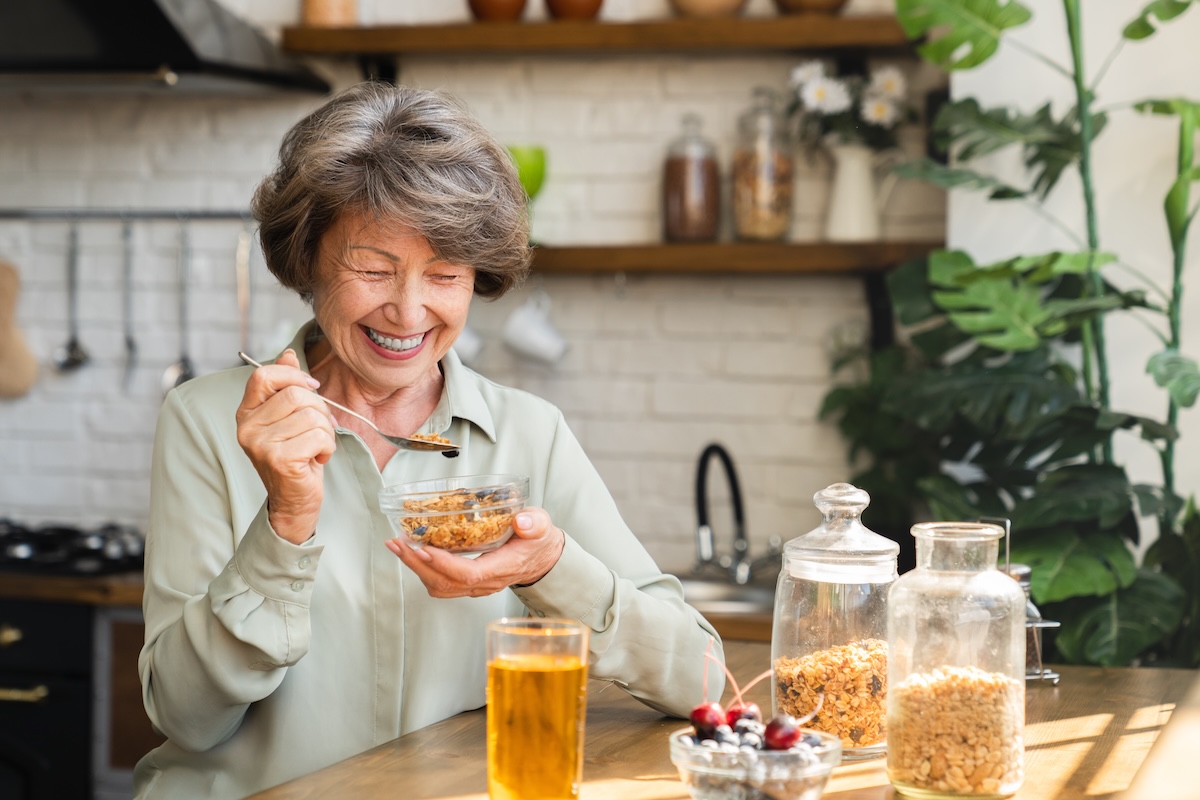
Nutrition Tips for Boosting Senior Vitality
Published by Vivage on
Sep 1, 2025 8:00:00 AM
Staying healthy and energized later in life isn’t just about exercise or a good night’s sleep—it begins with what’s on the plate. The right foods can make all the difference in maintaining strength, sharpness, and independence. In fact, nutrition for senior vitality is one of the most powerful tools for boosting both physical health and emotional well-being.As we age, our bodies process food differently, making it even more important to focus on meals that truly nourish. From stronger bones and steady energy to clearer thinking and better digestion, the right nutrition helps older adults feel more vibrant and engaged every day.
Why Nutrition Matters More with Age
As we grow older, our bodies naturally experience changes in metabolism, muscle mass, and nutrient absorption. These changes make food choices even more impactful. Prioritizing nutrition for senior vitality helps:
- Maintain a healthy weight and muscle tone
- Support heart and brain health
- Strengthen immunity and aid recovery
- Boost energy for daily activities and social engagement
Small, intentional choices—like adding colorful vegetables or staying hydrated—can bring meaningful improvements in how seniors feel each day.
Key Nutrients to Focus On
Certain nutrients play a central role in supporting senior vitality:
- Protein: Keeps muscles strong and supports healing. Found in fish, lean meats, beans, eggs, and yogurt.
- Calcium + Vitamin D: Vital for bone strength. Enjoy dairy, fortified foods, and leafy greens.
- Fiber: Helps digestion and blood sugar control. Whole grains, fruits, and veggies are simple sources.
- B Vitamins: Important for memory and energy. Look for fish, fortified cereals, and leafy greens.
- Healthy Fats: Support heart health and nutrient absorption. Found in avocados, nuts, olive oil, and fatty fish.
Balancing these nutrients helps seniors maintain strength, focus, and energy throughout the day.
Simple Nutrition Tips for Everyday Energy
Healthy eating can be simple and rewarding. These tips can help you make nutrition a natural part of each day:
- Eat Smaller, Balanced Meals Throughout the Day: Instead of heavy plates, aim for smaller portions that mix protein, vegetables, and whole grains. This helps steady energy and supports easier digestion.
- Stay Hydrated: Older adults may not always feel thirsty, but hydration is key to focus and energy. Keep water handy and sip throughout the day. For variety, try herbal teas, broth, or fruit-infused water.
- Add Color to Your Plate: Colorful meals mean more nutrients. Think berries, leafy greens, carrots, and bell peppers—each adds a boost for health and vitality.
- Limit Processed Foods and Added Sugars: Skip packaged snacks and sugary drinks that cause energy crashes. Fresh fruits, veggies, lean proteins, and whole grains provide steady fuel.
- Listen to Your Body: Appetite and digestion shift with age. Adjust portion sizes, meal timing, and food choices to what feels comfortable and keeps energy up.
How Senior Care Homes Support Healthy Eating
Healthy eating doesn’t have to happen alone. Many senior care homes make nutrition for senior vitality simple by serving fresh, balanced meals that match different health needs. Dietitians and chefs often work together to plan menus that promote energy nd overall wellness, while still being delicious.
Sharing meals with others is equally important. Sitting down to eat with friends and neighbors turns dining into a social experience, helping residents feel more connected, supported, and energized—both mentally and physically.
The Role of Supplements in Senior Nutrition
While a balanced diet is always the foundation of good health, some older adults may still need a little extra support. Supplements can help fill gaps when specific nutrients are harder to get through food alone. For example, vitamin D supports strong bones, omega-3 fatty acids promote heart and brain health, and vitamin B12 provides an important boost to energy.
Since every individual’s needs are different, it’s best to consult with a doctor or dietitian before adding supplements. Some vitamins and minerals may interact with medications, so professional guidance ensures safety and effectiveness. When used thoughtfully, supplementation can be a helpful addition to a healthy eating plan, further strengthening nutrition for senior vitality.
Nourishment for Body and Mind
Eating well is about more than calories—it’s about supporting a lifestyle filled with energy, purpose, and connection. By focusing on nutrition for senior vitality, older adults can feel stronger, think more clearly, and enjoy each day with confidence.
Whether it’s through small changes at home or the guidance provided in senior care homes, the right foods can make all the difference. A balanced approach to nutrition can be one of the most powerful tools for staying healthy, active, and vibrant at any age.
Every step toward better care starts with a conversation. Connect with Vivage-Beecan today to explore the right options for your family.